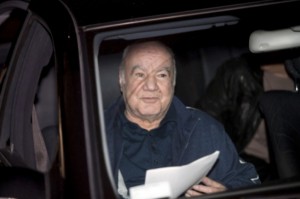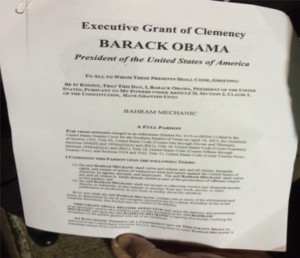The following piece was forwarded to me by an analyst from a respected and well known firm in the print industry. This is his opinion, not mine. The article is about the release of Smart Power CEO Bahram Mechanic and executives reported here in April 2015 from Federal prison. The short of it is, it appears Mr. Mechanic was arrested earlier this year and he was just released with a Presidential Pardon. Again, this is not my piece. Enjoy. ~Andy
Bahram Mechanic, invested in Faratel Inc. in Tehran, Iran in 1972, 7 years before the Islamic Revolution and the Iran hostage crisis. In 1985, Mechanic moved to the United States, but continued owning shares in privately held Faratel and eventually opened a similar, but smaller, operation in Houston, Smart Power Systems. According to the company’s website, since 1984, the Houston-based firm has manufactured and developed power protection products including uninterruptible power supplies (UPS), computer grade filters and automatic voltage regulators for the point of sale (POS), Multi-Function Printers (MFPs), IT/networking, telecommunications, security and office markets. Smart Power products have earned endorsements from leading industry vendors like Posiflex and Bell & Howell. Smart Power Systems self-touts that the development of the Transformer-Based Filter has been referred to as a “break-through product” in the power protection industry.
Forbes Article on Obama Pardon of Mechanic
On April 16, 2015, the United States District Court in the Southern District of Texas indicted five individuals, including Mechanic, and four companies on 24 counts related to illegally exporting sensitive military microelectronics and power supplies to Iran. A portion of the indictment reads as follows:
- The defendants, including the individuals Bahram Mechanic, Khosrow Afghahi, Tooraj Faridi (all three described as “United States persons”), Arthur Shyu, Matin Sadeghi, and the companies Faratel Co., Smart Power Systems Inc., Hosoda Taiwan Limited, and Golsad Istanbul Trading Ltd., are charged with violating the International Emergency Economic Powers Act by “exporting high-tech microelectronics, uninterruptible power supplies and other commodities to Iran.”
- These technologies had uses in “military purposes, including surface-to-air missiles and backup power sources for military or nuclear energy systems.”
- The defendants are also charged with money laundering, conspiracy, and related offenses. They allegedly used multiple foreign financial transactions to launder Iranian payments for the goods.

“The defendants charged in the indictment allegedly circumvented U.S. sanctions and illegally exported controlled microelectronics to Iran,” said Assistant Attorney General Carlin at the time of the indictment. “Violations of the International Emergency Economic Powers Act not only can undercut the impact of U.S sanctions, but can also serve to undermine U.S. foreign policy and adversely affect national security. I want to thank all those in law enforcement whose tireless efforts led to these charges.”
During an unusually long five-hour detention hearing on Monday, April 27th 2015, in a jam-packed courtroom, Houston-based FBI agents spent two hours detailing the government’s investigation which included email interception, phone wiretaps and home searches. The search warrant authorized authorities to access information about Smart Power Systems dating back to 2010, according to Special Agent Crosby Houpt. He said Mechanic and Faridi sold $24 million USD in parts to Iran as components for uninterrupted power sources and other electronics over a five-year period. Mechanic’s legal team and surrogates that write pieces for Forbes.com positioned the argument that Mechanic is simply an “Innovative engineer and inventor, an Iranian businessman who was caught in the changing political tides between the U.S. and Iran”. However, testimony that day in late April also revealed Mechanic was not a first time offender; he was sentenced to five years of probation for a criminal export violation conviction in 1987. He also settled with the U.S. government about civil export violations in the 1990s. The FBI reported a number of organizations Mechanic did business with in Iran, including the Iranian Ministry of Defense, the Atomic Energy Organization of Iran and the Iranian Centrifuge Technology Company.
Christopher Coughlin and Andrea Stricker of the Institute for Science and International Security wrote in their Case Study: Skilled Procurement Ring Charged in Illegally Obtaining Goods for Iran, “This case shows that Faratel essentially used Smart Power Systems in Houston, Texas as a supply point to funnel huge amounts of goods to Iran. It is troubling that smugglers working for Iran can simply set up shop in a country with aggressively enforced export control laws and operate unhindered for several years. In this context, past investigations and prosecutions into Mechanic’s activities did not deter future engagement in such activities. Mechanic’s financial gains indicate a great economic incentive for continued participation in illicit procurement schemes. He apparently profited handsomely; in 2014, he claimed personal assets of more than $8.5 million in the United States and $12.5 million in Iran in addition to ownership of Faratel, valued in 2013 at $18 million.”

Saturday it was announced that President Barrack Obama pardoned seven men of Iranian origin either facing criminal charges in U.S. courts or already serving time in U.S. prison. Bahram Mechanic, who due to the sensitivity of his case was held without bond since his arrest, and his alleged accomplices were among them. Their freedom is part of a prisoner swap which saw four U.S.-Iranian dual nationals freed. Jason Rezaian, a correspondent for the Washington Post who was arrested in July 2014 and accused of spying. The two other Americans are Amir Hekmati, a former US Marine who was charged with spying, and Saeed Abedini, a convert to Christianity who gathered a Bible study group, all were all sent on a flight to Germany as part of the deal. In a prisoner exchange, those being held are usually whisked away back to their home country. However Bahram Mechanic chose to stay, he was met by his wife at the federal prison and they drove back to their luxury condo in downtown Houston and he plans to return to work at Smart Power Systems as soon as today.
Until Saturday, President Obama had never granted a pre-trial pardon to anyone, nor had his predecessor, President George W. Bush. “It’s really unusual,” said former Justice Department pardon attorney Margaret Love, noting that President George H. W. Bush did some in the Iran-Contra probe and President Bill Clinton did as well. President Gerald Ford famously issued an unconditional pardon not only pre-trial, but without any charges having been filed, for former President Richard Nixon in the Watergate affair. One reason to grant a pardon, rather than simply dismiss charges, is that the pardon provides an assurance that the charges will never be refiled. It’s possible the Iranian Government Officials insisted on such certainty and Bahram Mechanic and his accomplices were important enough to Iranian interests to be included in this deal.